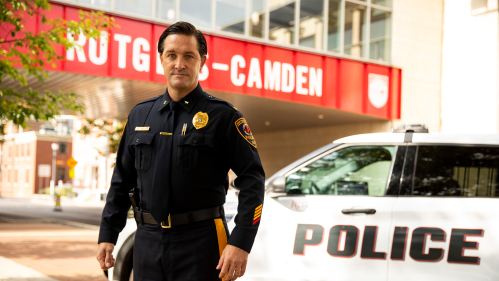Rutgers-Camden Police Chief Helped Bring Model of De-Escalation Techniques to New Jersey

Rutgers has been a leader in advancing the innovative training program
In 2015, after a number of incidents focused on police use of force, an independent research organization that focuses on critical issues in policing set out to study the causes and solutions to the ongoing issue.
The Police Executive Research Forum (PERF) started looking into how force was used, and what could be done going forward to resolve incidents and avoid the use of deadly force. One of the officers involved in crafting the resulting training curriculum called Integrating Communications, Assessment, and Tactics (ICAT) was Kevin Lutz, then a Camden County police captain who now serves as the Rutgers-Camden police chief. Throughout his career in law enforcement that has spanned more than two decades, Lutz has built a reputation as a champion of de-escalation, accountability, and community policing.
“The program inspires top-down support and a shift in police culture. This training is not meant to eliminate force altogether, but rather provides officers with options to safely resolve tense situations, Lutz said. “The training teaches officers to utilize appropriate levels of force only as a last resort and lets them know that their decisions are supported by their superiors. Self-defense and the protection of others go hand in hand with de-escalation. Rutgers-Camden has provided unequivocal support of our Police Department in providing us with a state-of-the-art headquarters, set to include a matted training room for our organization to remain at the forefront of these efforts.”
He recently attended the opening of the country’s first ICAT training facility in Decatur, IL. The innovative training curriculum combines classroom training with scenario-based exercises to help police officers successfully and safely resolve incidents without the use of deadly force.
The Rutgers University Police Department (RUPD) was among the first in New Jersey to begin ICAT training even before a 2021 state mandate. New Jersey was the first state in the nation to make ICAT training mandatory and, in conjunction with the Attorney General’s Office, Lutz helped oversee the statewide rollout. Rutgers, however, was already advancing the program. “RUPD has embraced ICAT from its inception, as far back as 2017, and that is something that attracted me to the organization,” Lutz explained.
The new Decatur training facility features state-of-art-classrooms, modern equipment, and scenario-based training including an entire indoor city replete with mock store fronts, banks, and a train station where cops can role play and work on their responses to lethal situations they may encounter on the job. The facility is entirely funded by the Howard G. Buffett Foundation. Buffet is the second of business tycoon Warren Buffett’s three children.
In 2015, PERF sponsored a trip to Scotland to study the country’s unique approach to deadly force encounters and de-escalation training. PERF Executive Director Chuck Wexler had the foresight to recognize this. Buffett was on the Scotland trip, and the seed for the training center was born.
“Officers in Scotland do not carry firearms,” Lutz explained. “Their unique approach to potentially deadly encounters helped inform us of a possibly different way of doing business. It’s about utilizing space and time as a tactic when safe to do so, getting the correct resources to the scene, and utilizing a unified thought process known as the critical decision-making model (CDM) to navigate these difficult assignments.” He continued, “The principles of ICAT can be universally applied, with the primary focus on situations which do not involve an individual armed with a firearm. The focus being those involving unarmed adversaries, or those armed with a knife, a brick, a bat, or blunt object of some sort. Mental illness and drug addiction frequently come into play and our officers need to be provided with every possible resource to safely resolve these encounters.” Campus police departments such as RUPD frequently deal with mental illness and drug or alcohol issues, and proper training is critical to a peaceful resolution to these scenarios.
In cities like those in which Rutgers has campuses, a response to a 9-1-1 call may result in any number of law enforcement agencies converging on the scene, from campus police to city, county, and state police. Consistent training for all officers is key to shaping desired outcomes. “In Camden, there are numerous law enforcement agencies working together at any given time,” said Lutz. “Cross-training, especially for events such as an active shooter, is critical. Preparation and relationships, like those we have formed with the Camden County Office of the Sheriff Emergency Response team, are key to ensuring the safety of our campus and the community that supports it,” added Lutz.
In June, Lutz was also a speaker at the Law Enforcement Knowledge Lab conference where he spoke about organizational change and de-escalation training in the field. In April 2022, the Justice Department launched the National Law Enforcement Knowledge Lab as a resource hub to identify and disseminate fair and effective policing practices, training, and technical assistance. The Knowledge Lab relies on the United States Constitution as its guiding document for fair and effective policing. Having deep roots in the public safety paradigm shift in Camden City, Lutz shared his personal experiences during his time with the Camden City, Camden County, and now Rutgers University Police Departments.
“This training is a mindset. A mindset that will support and carry officers through situations that involve individuals in crisis. RUPD and the State of NJ remain at the forefront of training our law enforcement officers to face these challenging situations. Our actions are saving lives in our communities, while positively impacting families and careers, alike. I’m proud of being at the center of this change in our profession and look forward to the collaborative work that lies ahead,” he said.

